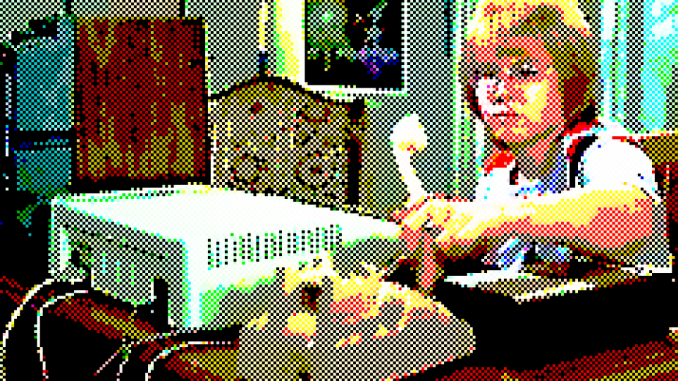
 While using an on-line service like CompuServe allowed you to chat with people all around the world, its per-hour charge was not that attractive to perpetually-broke teenagers. Also, you couldn’t really go ‘hang out’ with people in Belgium, and teenagers really like to go hang out. So there was room in the market for a lower-cost more localised chat service.
While using an on-line service like CompuServe allowed you to chat with people all around the world, its per-hour charge was not that attractive to perpetually-broke teenagers. Also, you couldn’t really go ‘hang out’ with people in Belgium, and teenagers really like to go hang out. So there was room in the market for a lower-cost more localised chat service.

Enter Diversi-Dial. One of the attractive features of the Apple II was its seven internal expansion slots. Typically, these would be used for disk drive controllers, serial communication cards, parallel printer cards, sound cards and so forth. But there was nothing stopping you from stuffing then all with modems! Once you’d done that, all you needed to do was write a program that broadcast incoming messages from one modem card to all of the other modem cards – of course, it’s more complicated than that, but that’s the gist. Or you could buy Diversi-Dial software which did that for you.

Initially, the pitch from Diversi-Dial’s developer, Bill Basham, was that you could make a pile of money from operating a ‘station’ (the term used for a D-Dial installation) through membership fees and advertising with local businesses. But the whole advertising thing didn’t really fly, and over time the price of the software dramatically dropped. But membership fees were still common – the station’s system operator (sysop) still had to pay for phone lines, and in the 1980s ‘commercial’ lines were expensive (as much as US$70 per month, each!

Typically a membership on a D-Dial would run you $5-10 a month. Or you could just call up and chat for free, but you would get disconnected every few minutes and have to call back, and during busy times you could lose your ‘slot’ (which was a modem plugged into an actual slot!) Also, sometimes the system could be set to refuse freeloaders. So this was a big incentive to part with some of your cash, even though you’d really rather put it into Marble Madness or some other arcade game.

Once you had that membership, though, the next issue was what your parents thought, first about you tying up the phone line for hours at a time (if you pushed it too far they might force you to get your own phone line, and if that happened you might start your own BBS) and secondly about you spending those hours talking to complete strangers, many of whom older adults (stranger danger!) While it was the 1980s and parents were much more relaxed about these things, they weren’t that relaxed.

Generally though, the people you met through D-Dial were pretty safe – these folks had computers, after all, and so were usually middle-class or higher – but teenagers being teenagers there was usually drinking and weed and maybe some LSD. Also hacking (wardialing: randomly calling phone numbers to find a modem, the most sought after of which was called an ‘outdial’, a modem relay typically run by companies to allow their employees to connect to head office computers without paying long distance charges, which were quite expensive in the 1980s! But if you found an outdial you could use it to call chat systems in far away lands…)
Of course, in modern times the Internet makes all of this seem trivial. But in the 1980s, D-Dial and other chat systems allowed teenagers to meet people they otherwise wouldn’t have, broadening their horizons.
You can log-on to a real Diversi-Dial system by telnetting to rmac.d-dial.com

Be the first to comment